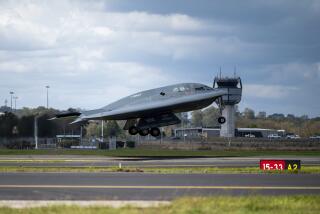New face of terror has Yemenis scratching their heads
- Share via
Reporting from Sana, Yemen — “Anwar Awlaki?”
Mmmmm.
“Is he a doctor? I don’t think I know him.”
Americans may regard the U.S.-born cleric with the beard and hard stare as a new face of terror, but when you mention Awlaki in the Yemeni capital, it’s as if you’ve asked someone to solve a complicated bit of arithmetic. Eyes narrow, faces scrunch.
“I don’t know who he is. I work all day and don’t watch a lot of TV,” said Ibrahim Abdulrab, standing over an ironing board with a pile of shirts at his feet.
The radical preacher is on the CIA’s assassination list and is believed to be hiding with Al Qaeda fighters in Yemen’s mountainous tribal lands. He is implicated in a number of plots, including inspiring a U.S. Army psychiatrist who is charged with killing 13 people a year ago at Ft. Hood, Texas, and the recent attempt to blow up aircraft with packages of concealed explosives.
Internet videos, website manifestos and pundit rhetoric are splicing Awlaki into the American consciousness. But he is largely unknown here or referred to as an apparition hiding in a distant crevice. Even his Al Qaeda in the Arabian Peninsula is scoffed at by many as an invention, a ploy by Washington and Yemeni President Ali Abdullah Saleh to advance larger agendas.
Rumors dart like sparrows across this city, flitting through conversations, sermons and newsrooms. Perceptions are shaped by conjecture and thinly drawn asides. They highlight the ideological and emotional divides between the U.S. and the Middle East on matters ranging from drone strikes in Pakistan to the elusive characters and strange blueprints of global terrorism.
“Al Qaeda in Yemen? A myth,” said Mohammed Asari, a university student dressed in a blue blazer and sitting on a motorcycle. “I haven’t seen them. They’re mentioned on the news, but I don’t trust the news. It’s full of liars.”
He slipped on his sunglasses and rode away, just as another student, Isa Ahmed, strolled into an alley past rows of books for sale on blankets. “Al Qaeda is not real,” he said. “They’ve been created for political reasons. We don’t know what’s going on or what exists and what doesn’t.”
In an electronics store, pecking away at a laptop on a slow morning before prayers, Khaled Farih offered a theory.
“Al Qaeda is an Israeli gang using Islam as a cover,” he said. “They want to defame Islam through terrorist acts. Yemen has a lot of enemies and they’re all looking for gaps to slip through and destroy us. Al Qaeda might also be the work of the secessionists who want to divide Yemen.”
Many Yemenis believe that Saleh, a shrewd tribesman who has ridden atop this country’s rambunctious politics for three decades, is inflating the strength of Al Qaeda’s regional branch as a ruse to attract Western aid. His government has attempted to link terrorist elements to an intensifying separatist movement in the south that analysts fear could ignite a civil war.
But nobody knows; figuring out reality here is like reading road signs in the fog. Besides, there are too many other problems: joblessness, corruption, malnutrition, human rights abuses and questions like how a man such as Abdulrab, who charges about 24 cents for each shirt he irons, feeds his family.
Don’t complain too loudly. The beggar at your elbow may be a spy. Interlopers are everywhere, listening, making phone calls. Or so it seems. Yemenis love intrigue, folding and unfolding possibilities, sketching scenarios to fit a confusing world beyond the old city’s fortress walls.
But what of Awlaki? A Yemeni judge on Saturday ordered his “forcible arrest.” But despite his website and eloquent missives, Awlaki, known for public relations savvy and quoting from the Koran and Charles Dickens, drew barely a hint of recognition from shopkeepers, waiters and computer engineers along Sana’s streets and alleys.
“Never heard of him,” said Adnan Lotef, who served flat bread and tin plates of beans at a cafe not far from men with paint rollers and shovels waiting on corners and hoping for a day’s work.
Down the sidewalk, past a stand of bags of yesterday’s popcorn, a kettle steamed in a tea shop. Asad Hussein had no customers, but customers come and go, and much of life is spent in the lulls between.
He took a seat.
“Anwar Awlaki?” he said. “Yes, I know who he is. He is not of Islam. He is not a real Muslim. His behavior against the world is not right. We should do no harm to one another. It’s Allah who should decide whether we go to heaven or hell, not Awlaki.”
More to Read
Sign up for Essential California
The most important California stories and recommendations in your inbox every morning.
You may occasionally receive promotional content from the Los Angeles Times.














